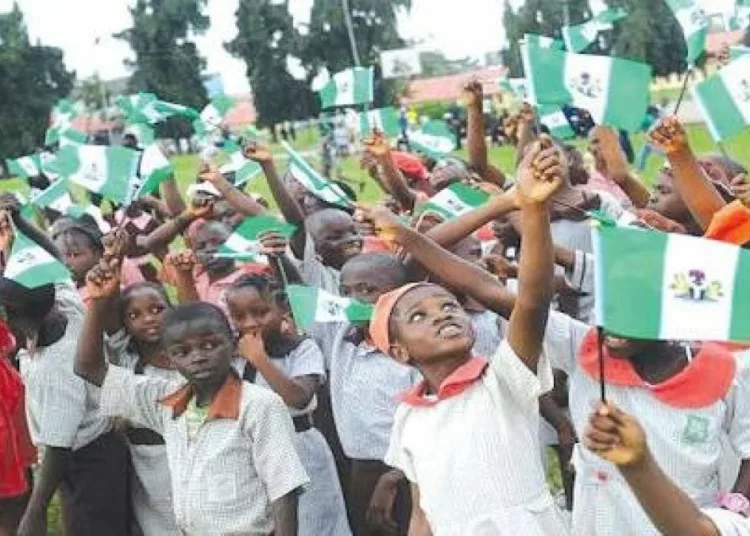As Nigeria marks Children’s Day today with the theme “Tapping the Untapped Natural Treasure,” the cruel irony is unmistakable. While the nation speaks of unlocking children’s potential, it simultaneously presides over one of the world’s most devastating assaults on childhood itself.
The statistics are not merely numbers—they represent a generational catastrophe that threatens to undermine Nigeria’s future as a viable nation-state.
The sobering reality confronting Nigerian children today should shame every conscience and galvanise immediate action. With 18.3 million children out of school—more than the entire populations of Norway, Singapore, and Cuba combined—Nigeria holds the ignoble distinction of having the highest number of out-of-school children globally.
This is not just an educational crisis; it is a national emergency that demands urgent intervention at the highest levels of government and society.
The multifaceted nature of this crisis reveals the depth of systemic failures across multiple sectors. Since 2014, over 1,600 children have been abducted or kidnapped from their schools, according to Save the Children, a nongovernmental organisation (NGO), transforming educational institutions from safe havens into potential death traps.
In 2023 alone, 439 schools nationwide were forced to close due to occupation by state and non-state actors or fear of attack, as reported by UNICEF’s Nigerian director Dr. Tushar Rane. The unconscionable choice forced upon parents—risking their children’s lives for education or condemning them to illiteracy— presents a fundamental breakdown of the state’s primary obligation to protect its citizens.
The malnutrition crisis compounds these educational disasters. With 5.4 million children aged 0-59 months suffering from acute malnutrition—a staggering 23 percent increase—Nigeria is witnessing the physical and cognitive stunting of an entire generation. When children lack adequate nutrition, their capacity to learn diminishes, creating a vicious cycle that perpetuates poverty and underdevelopment.
Perhaps most disturbing is Nigeria’s rank as the third highest country globally for child marriages, with 23.6 million women married before age 18 and over 10 million before age 15, according to UNICEF data. These young girls, robbed of their childhoods and educational opportunities, are condemned to cycles of poverty, poor health, and marginalisation. The physical and psychological toll of such practices is incalculable, representing a massive waste of human potential and a violation of fundamental human rights.
The exploitation continues through child labour, with over 24 million Nigerian children engaged in such activities as of 2022, including 14.3 million performing hazardous work according to the National Bureau of Statistics (NBS). These vulnerable youth toil in dangerous mines, fields, and factories, exploited as cheap labour while being denied education, recreation, and the fundamental joys inherent to childhood itself.
While it is noteworthy that all 36 states have now passed the Child’s Rights Act—with Bauchi becoming the final holdout in December 2023—the legislation remains largely aspirational without robust implementation and enforcement mechanisms. The fact that it took over two decades for universal adoption speaks volumes about the political will surrounding children’s welfare.
Laws without enforcement are merely paper tigers that offer false comfort while children continue to suffer.
The federal government’s recent initiative to unlock over N263 billion in basic education funds trapped in bureaucratic delays offers a glimmer of hope. President Bola Tinubu’s approval of a new strategy to unblock UBEC fund utilisation could significantly improve educational outcomes across over 30 states.
However, this reactive approach to addressing a five-year backlog highlights the systemic inefficiencies that have long plagued Nigeria’s educational sector.
The intervention by the Ministry of Women Affairs, under Minister Imaan Sulaiman-Ibrahim, represents a more comprehensive approach to child protection. The ministry’s budgetary enhancement exceeding 1000 percent and the reestablishment of the Child Protection Knowledge and Data Center demonstrate serious commitment.
However, the scale of intervention required demands coordination across all levels of government and society.
What Nigeria needs is nothing short of national mobilisation that will treat children’s welfare as a matter of national security. The federal government must establish educational institutions as protected zones, with robust security deployments and strict accountability for officials who fail in their duty to safeguard schools.
States must be compelled to access available UBEC funds through streamlined processes that eliminate bureaucratic bottlenecks.
More fundamentally, Nigeria must address the root causes driving these crises. Poverty, which forces families to send children to work or marry them off, requires comprehensive social safety nets and economic empowerment programmes.
Religious and traditional leaders must be engaged in campaigns against harmful practices, while law enforcement agencies need training and resources to effectively prosecute violations of children’s rights.
As Nigerians observe Children’s Day 2025, the focus must shift from ceremonial niceties to concrete action. The theme of “Tapping the Untapped Natural Treasure” becomes meaningful only when backed by resources, political will, and sustained commitment. Every day of delay costs lives, destroys futures, and diminishes Nigeria’s prospects.
The untapped natural treasure of Nigerian children can only be realised when they are safe, educated, healthy, and empowered. Anything less is a betrayal of their rights and the nation’s future.











